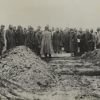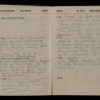
Devon Sergeant’s diary reveals Somme horror
The personal diary of Sergeant James Littler is being published online 100 years after he survived the fierce fighting at the Battle of the Somme on the National Army Museum’s commemorative website First World War in Focus.
Littler arrived on the Somme on 29 July 1916. Allied attacks had been launched on 1 July and continued into mid-November, but with German counter attacks the offensive eventually included 12 separate battles. These battles often went on for weeks at a time and Littler recorded how the men awaited their fate in a ‘hell-hole’.
After four and a half months the Allies had only advanced seven miles and the British Empire had suffered 420,000 casualties, making the battle one of the bloodiest in history. Littler, summing up the Somme in his own haunting words, calls it ‘a mass of dead’ with a rotten smell that ‘makes one hate war’.
His diary also tells of how so much punishing death and destruction had a knock-on effect on the men’s morale. Littler observed that ‘everybody seems to expect to die. The Somme shakes the best.’ In October, after his ‘dear pal Alf Fishwick [was] badly smashed’ Littler felt ‘as though all is lost’. Even the parson reminds them at one point that ‘many will die’ during a special intercession service.
Those who survived the fighting relatively unscathed still had to face minimal rations and injury in the trenches. At the end of August, Littler rejoices in having ‘bread at last’ following weeks of hunger living off ‘iron rations’ (consisting of preserved meat, cheese, biscuits, tea, sugar and salt). By October 16 trench foot had broken out.
Common among troops in the trenches, the painful condition, which is caused by long immersion in cold water or mud, results in swelling, blisters and open sores, leading to even worse infections and gangrene, Littler describes it as a ‘gruelling day’.
The diary also helps to provide a rare insight into the troops thoughts of their families back home. Littler wonders ‘what my poor mum and dad are thinking? Thank God they cannot think the truth of this unbearable life’, indicating how he struggled mentally throughout the battle. Just 21 years old at the time, the sergeant’s words highlight the wish to keep his parents in the dark about the reality of war.
After the Battle of the Somme, Littler was promoted to regimental quarter master sergeant, and continued to serve on the Western Front until transferring to the Royal Air Force in April 1918. After the war, he married and had a daughter in Manchester before moving to Devon, living there until he died on 8 March 1961 in Exeter.
Dr. Peter Johnston, Collections Development and Review Manager at the National Army Museum commented: “Sergeant Littler’s diary provides a rare detailed account of day-to-day life in the trenches during the Battle of the Somme, adding insight to our knowledge of the First World War. His account of his experiences highlights the horrific nature of battle, with the fear of death constantly around them. Limited food rations, injuries and thoughts of those at home compounded the melancholy feelings of troops during battle.”
Such personal accounts are being unveiled each month in the Soldiers’ Stories series, which helps to educate the public and share the best of the museum’s assets while it is closed for refurbishment. They piece together the development of the war from the point of view of those directly involved – one hundred years from the time that they describe.
An interactive global map also features on the portal, which geo-tags all the major events of the war, as well as a timeline to help users piece together the development of the conflict and a host of learning tools. The website is a unique resource that will help commit the events of one hundred years ago to the country's national memory in one central place.















